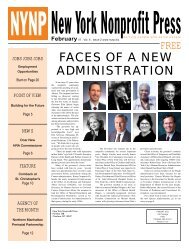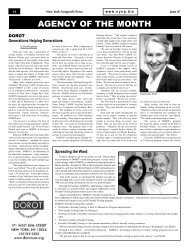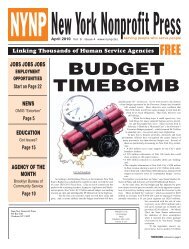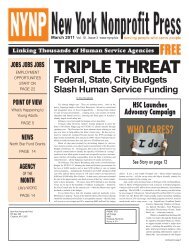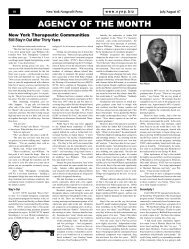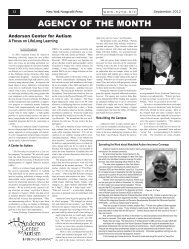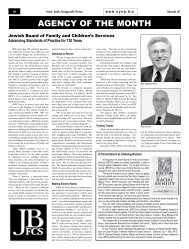September Edition 2004 - New York Nonprofit Press
September Edition 2004 - New York Nonprofit Press
September Edition 2004 - New York Nonprofit Press
Create successful ePaper yourself
Turn your PDF publications into a flip-book with our unique Google optimized e-Paper software.
12 <strong>New</strong> <strong>York</strong> <strong>Nonprofit</strong> <strong>Press</strong> www.nynp.biz <strong>September</strong> <strong>2004</strong><br />
AGENCY OF THE MONTH<br />
Big Brothers Big Sisters of NYC<br />
A Hundred Years Young<br />
“Mentoring has become one of the<br />
‘in’ buzzwords in social services,” says<br />
Allan Luks, Executive Director of Big<br />
Brothers/Big Sisters of <strong>New</strong> <strong>York</strong> City<br />
(BBBS). “Bush talked about mentoring<br />
in his State of the Union address. Clinton<br />
had a giant meeting on mentoring<br />
when he was president. Right now, we<br />
are ‘in’, but who knows for how long.”<br />
That is OK. BBBS has been involved<br />
with mentoring since before it was ‘in’.<br />
In fact, BBBS established the movement<br />
100 years ago when its founder, Ernest<br />
K. Coulter, a clerk in <strong>New</strong> <strong>York</strong> Children's<br />
Court, called upon a local men’s<br />
club to work with the youngsters he<br />
saw every day. Over the intervening<br />
century, Big Brothers/Big Sisters has<br />
become synonymous with mentoring –<br />
a brand name like Coca Cola or Xerox<br />
which effectively defined this specific<br />
form of youth development program.<br />
Today, BBBS directly connects 3,000<br />
children from low income, single parent<br />
homes with carefully-screened adult<br />
companions. It also serves as a vanguard<br />
for research and advocacy on<br />
mentoring issues as well as providing<br />
technical assistance and training for<br />
other mentoring programs. “We like to<br />
think of ourselves as a ‘training hospital’,”<br />
says Luks.<br />
The Big Brother/Big Sister service<br />
model is remarkably straight forward.<br />
“Bigs” commit to spend several hours<br />
with their Little Brothers or Sisters at<br />
least twice a month for a minimum of<br />
one year. The pairs go to ball games and<br />
museums, go bowling, spend time at<br />
the park, and talk. In the process, the<br />
Bigs offer a simple, yet powerful combination<br />
of friendship, guidance, support.<br />
Every relationship is monitored and<br />
supported by a social worker.<br />
This relatively straightforward program<br />
also has proven to be surprisingly<br />
successful. An independent and randomized<br />
1992 national study of the Big<br />
Brother/Big Sister movement found<br />
that it reduced first time drug use by 46<br />
percent, cut school absenteeism by 52<br />
percent, and lowered violent behavior<br />
by 33 percent. And, this sample population<br />
was no collection of cream puffs.<br />
Over 80 percent of the kids came from<br />
impoverished families, and almost all<br />
were being raised by a single parent.<br />
Approximately 40 percent were from<br />
homes with a history of drug or alcohol<br />
abuse and nearly 30 percent came from<br />
families with a record of domestic violence.<br />
In fact, the simpler the form of the<br />
relationship, the more valuable is the<br />
experience. Another long term study<br />
found that those “Bigs” who merely offered<br />
friendship and support -- rather<br />
than those trying to “straighten kids<br />
out” -- were far more likely to gain the<br />
trust necessary to create a positive influence.<br />
For most of its hundred year history,<br />
BBBS has offered its “traditional”<br />
program. Parents, typically low-income<br />
single moms or dads, learned<br />
about Big Brothers/Big Sisters through<br />
TV, subway ads or roadside billboards.<br />
The parents call and then come in to enroll<br />
their kids.<br />
Volunteers learn about the program<br />
the same way – through a broad-based<br />
advertising campaign as well as word<br />
of mouth from other volunteers. They<br />
attend general orientation meetings<br />
which are held regularly and, if still interested,<br />
go through an in-depth interview<br />
with a BBBS social worker. “It<br />
takes about an hour and a half,” says<br />
Vidhya R. Kelly, M.S.W., Director of<br />
BBBS’ Borough and Special Priority<br />
Programs. “It is a full psycho-social.<br />
We ask the volunteers everything about<br />
their background, their relationship history,<br />
their academic history, their family<br />
history, how they grew up, their occupation,<br />
what they do.”<br />
Volunteers who make it through<br />
the interview must then provide references.<br />
“We ask for three -- at least one<br />
from an academic advisor or work supervisor,”<br />
says Kelly. “We get a national<br />
background check. Then we check<br />
the sex offender list. It is expensive at<br />
the front end.”<br />
Roughly 60% of those who come in<br />
for the orientation go on to the interview,<br />
says Luks. Then about 60% of<br />
those will go on to be accepted. It leaves<br />
us about 36% who go on to become Big<br />
Brothers or Big Sisters. Most of the falloff<br />
results from self selection on the part<br />
of volunteers.<br />
“Usually it is not our rejection,”<br />
says Luks. “They will drop out once<br />
they learn about the level of commitment.<br />
It is four hours every other week.<br />
In a terrible economy when people are<br />
worried about losing their jobs or<br />
falling behind, that is real.<br />
“The biggest thing you worry about<br />
is whether the man or woman is going<br />
to continue the relationship,” he continues.<br />
“These kids all have problems. The<br />
last thing you want is for the Big Brother<br />
or Big Sister to walk away two<br />
months later.”<br />
In fact, while BBBS asks volunteers<br />
and kids for a one year commitment,<br />
the average match currently lasts two<br />
years, six months. “We have alumni<br />
networks where matches have gone on<br />
for 25 and 35 years and they still come<br />
back to different events,” says Kelly.<br />
The screening also is designed to<br />
guard against any risk to the child.<br />
“You are always worried about a pedophile,”<br />
says Luks, who maintains<br />
that BBBS has not experienced any<br />
abuse cases during its 100 year history.<br />
The pairing of Bigs and Littles is<br />
based on a variety of factors and BBBS<br />
social workers, typically MSWs, supervise<br />
the initial meetings when potential<br />
matches are broached to the parents,<br />
the Bigs and the Littles. All parties have<br />
to agree and a Mentoring Agreement<br />
spells out the requirements and responsibilities<br />
of the program. Social Workers<br />
offer lots of up front support to help the<br />
new relationship take root and provide<br />
ongoing oversight throughout the life<br />
of the match. “For the first several<br />
Allan Luks, Executive Director, Big Brothers/Big<br />
Sisters of <strong>New</strong> <strong>York</strong> City<br />
months there is involvement by the social<br />
worker on a weekly basis,” says<br />
Luks. “They call the volunteer, call the<br />
kid, call the mother. Then, they may go<br />
to monthly contacts.”<br />
All volunteers take a mandatory<br />
five hour training program on mentoring<br />
skills, and BBBS offers lots of other<br />
events and services to help support volunteers,<br />
kids and parents.<br />
“There are agency events where all<br />
the matches come together,” says Kelly.<br />
“We just had our Annual Picnic with<br />
1,300 people in Central Park. It is a time<br />
to meet other matches so the Bigs don’t<br />
feel all alone and the kids who have<br />
been isolated can see that there are other<br />
kids doing this -- that it’s OK and it’s<br />
cool. We offer events like that all<br />
throughout the year. We also do kids<br />
events separately from the Bigs where<br />
the social worker will take the kids out<br />
by themselves and do things so they<br />
can make connections with other kids<br />
in program.”<br />
BBBS arranges many group trips,<br />
helps volunteers identify inexpensive<br />
and appropriate activities and even<br />
runs groups for parents.<br />
Luks joined BBBS 15 years ago and<br />
has been building a whole new tradition<br />
of innovative programming ever



